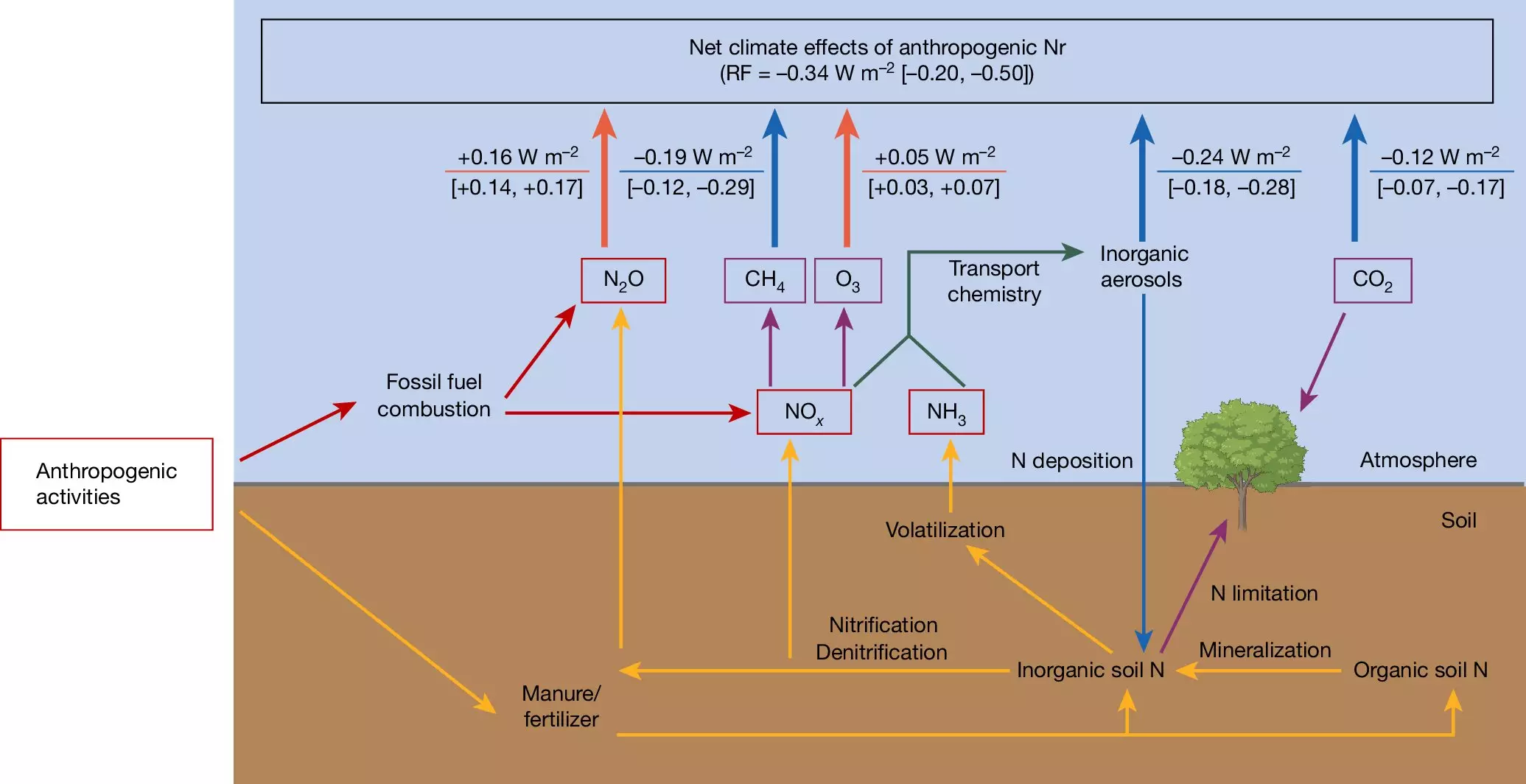Nitrogen, a fundamental element found in various forms, plays a crucial role in both agricultural systems and the atmosphere. While it constitutes around 78% of the air we breathe in its inert form, it is the reactive compounds of nitrogen that command attention, primarily due to their significant environmental implications. These compounds—including nitrous oxide, ammonia, and nitrogen oxides—are essential fertilizers that promote plant growth but also contribute to a host of environmental challenges. The dichotomy of nitrogen’s role poses a complex question: Can we leverage its benefits without overwhelming the ecosystem’s delicate balance?
Research led by the Max Planck Institute for Biogeochemistry reveals that the narrative surrounding nitrogen is intricately woven into the larger climate dialogue. The findings suggest that, despite the undeniable pollution associated with nitrogen emissions—such as air and water contamination that endangers biodiversity—the net climate effect of these pollutants could in some instances lead to a cooling phenomenon.
The Climate Cooling Controversy
One of the surprising revelations from the study is that the cooling effect of certain nitrogen emissions may offset warming caused by greenhouse gases. For example, nitrous oxide, primarily emitted through agricultural activities and fossil fuel combustion, is significantly powerful as a greenhouse gas, being approximately 300 times more potent than carbon dioxide over a shorter time frame. This complicates the climate narrative. The emissions from nitrogen compounds not only degrade air quality but can also lead to beneficial outcomes, such as increased CO2 absorption by enhanced plant growth.
The dichotomy within the nitrogen cycle reveals a complicated web of ecological and atmospheric interactions. Short-lived nitrogen oxides, primarily released through fossil fuel combustion, can have a cooling effect by promoting the formation of fine particulate matter that reduces sunlight penetration. This is a fascinating instance where nitrogen compounds take on dual roles – both nurturing vegetation and simultaneously reducing sunlight’s warming potential on Earth.
Quantifying Environmental Effects: A Complex Equation
The intricate dynamics of nitrogen and its effects on climate were assessed through comprehensive modeling efforts, reflecting the importance of accounting for numerous environmental variables. The study indicated that human-induced nitrogen compounds contribute to a net cooling effect quantified at -0.34 watts per square meter, a compelling figure in the broader context of anthropogenic climate change. The stark contrast to the estimated 2.7 watts per square meter heating from fossil fuel-derived greenhouse gases starkly emphasizes the need to scrutinize our nitrogen use and its cascading effects on global temperatures.
Nevertheless, the complexity lies in local versus global impacts. Sönke Zaehle, a leading scientist in the study, cautions against oversimplifying nitrogen’s role in climate change, arguing that certain effects manifest locally, and climate systems respond in multifaceted ways. The take-home message is clear: while nitrogen can exert a cooling influence, it should not obscure the pressing need to mitigate its adverse effects on health and ecosystem integrity.
The Environmental Cost of Nitrogen Emission
Undeniably, the pressing environmental costs associated with nitrogen emissions cannot be understated. Despite any cooling benefits, the detrimental impacts—including compromised air quality and biodiversity loss—should resonate powerfully within discussions about climate policy. It is imperative that stakeholders approach the nitrogen issue with a nuanced understanding that balances agricultural productivity with environmental stewardship.
Moreover, the ongoing challenge of over-fertilization and its repercussions on water bodies—such as algal blooms resulting in ‘dead zones’—cannot be ignored. With nitrogen runoff posing significant threats to aquatic ecosystems, the necessity for improved agricultural practices becomes even more pronounced. Strategies must be implemented that enhance nitrogen use efficiency, helping to curtail emissions while still meeting food production needs.
A Call to Action: Rethinking Nitrogen Management
The research delivers a resounding call for innovation in nitrogen management. Farmers, policymakers, and environmental advocates must collaboratively design strategies that minimize emissions without sacrificing the benefits of nitrogen as a fertilizer. Enhanced digital tools and agricultural technologies can facilitate precise applications of nitrogen, thus reducing waste and minimizing harmful runoff.
Furthermore, the urgency for broader systemic change in fossil fuel consumption cannot be overstated. Reducing greenhouse gas emissions derived from fossil fuels is essential in tandem with managing nitrogen inputs effectively. Only through an integrated approach can we hope to address the multifaceted challenges posed by nitrogen in our climate crisis, fostering an era where agricultural integrity and environmental health coexist harmoniously.
Recognizing the dual nature of nitrogen compounds is vital in shaping actionable strategies for sustainable development. We are confronted with an environmental conundrum that requires astute navigation to ensure the well-being of both the planet and its inhabitants.


Leave a Reply